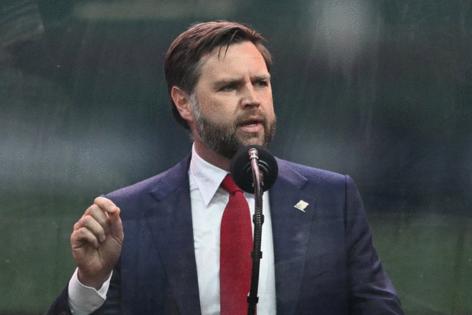Trump's cuts to public broadcasting and foreign aid clear key vote
Published in News & Features
Public broadcasting and a swath of foreign aid programs are on track to lose federal funding after the Senate voted to advance a $9.4 billion package of cuts on a 51 to 50 vote, with Vice President JD Vance breaking a tie.
The procedural vote is a strong sign the bill will pass the Senate after a marathon amendment session planned for Wednesday. That would be a victory for President Donald Trump, who overcame reluctance on the part of some moderates by making political threats and tweaking the bill to allay some objections.
Passage of the measure would also add momentum to Department of Government Efficiency cost cutting effort started by former Trump ally Elon Musk. The White House plans a series of fast-track rescissions bills to claw back DOGE-identified funds, using a provision of budget law to bypass the Senate filibuster.
Nearly all Senate Republicans united behind the Trump administration proposal to advance the bill after a deal earlier Tuesday to spare global AIDS health funding from $400 million in cuts. That provision of the legislation is set to be stripped out of the measure before it gets a final vote, likely Wednesday.
Senators Susan Collins, Lisa Murkowski and Mitch McConnell, all Republicans, voted no.
If the Senate approves the package of cuts Wednesday, the House plans to vote before a Friday deadline under U.S. budget law, after which the White House would have to release the funding.
The final vote was sealed after the White House promised Senator Mike Rounds of South Dakota that it would send $10 million in funds to tribal radio stations to lessen the impact of the cancellation of federal funds to the Corporation for Public Broadcasting. Senator Jerry Moran of Kansas said he has received assurances on how cuts to global food aid would be implemented.
The moderates’ efforts to lessen the spending cuts enraged Senate conservatives intent on taking back already enacted government funding.
“If you talk the game and say, ‘Let’s reduce spending,’ and you vote against this bill, in my opinion, you ought to hide your head in a bag because you will be able to cut the hypocrisy with a knife,” Louisiana Republican John Kennedy said on the Senate floor.
The House last month passed the rescissions package on a narrow 214 to 212 vote.
The measure would eliminate funding for the Corporation for Public Broadcasting, which funds PBS and NPR, entities which have long been targeted by conservatives for alleged liberal bias.
“They have betrayed the trust of the American people,” bill sponsor Senator Eric Schmitt of Missouri told reporters. “They have been ideologically captured by the left.”
Senate Democratic leader Chuck Schumer, however, said the package eliminates access to children’s and cultural programming while empowering China but slashing foreign aid to allies.
“Americans are done listening to Republican lectures about cutting spending after they added $4 trillion to the debt,” Schumer added.
The public media outlets receive a small portion of their funding from federal sources in addition to dollars from sponsors and individual donors. The networks have said that smaller stations, which produce local-oriented programming, could close as a result of the cut.
The package would also cancel funding for foreign aid grants in the U.S. Agency for International Development’s budget as well as for smaller agencies targeted for closure by Trump like the U.S. Institute of Peace.
Democrats say the partisan vote to strip already approved congressional funding undermines the bipartisan annual appropriations process and could lead to an Oct. 1 government shutdown.
Rescission is a little-used legislative tactic for taking back spending already appropriated by Congress. Under the Congressional Budget and Impoundment Control Act of 1974, Trump can freeze the funding for 45 days while Congress considers the cuts using a fast-track process. If Congress doesn’t act within that time, the president must spend the money.
White House Budget Director Russ Vought has said he plans to send more rescission requests after August 15 to test a legal theory allowing for so-called “pocket rescissions.”
Under the theory, likely to be tested in court, the administration can seize funds if it submits a request within 45 days of the end of the fiscal year and Congress fails to act on it.
©2025 Bloomberg L.P. Visit bloomberg.com. Distributed by Tribune Content Agency, LLC.







Comments